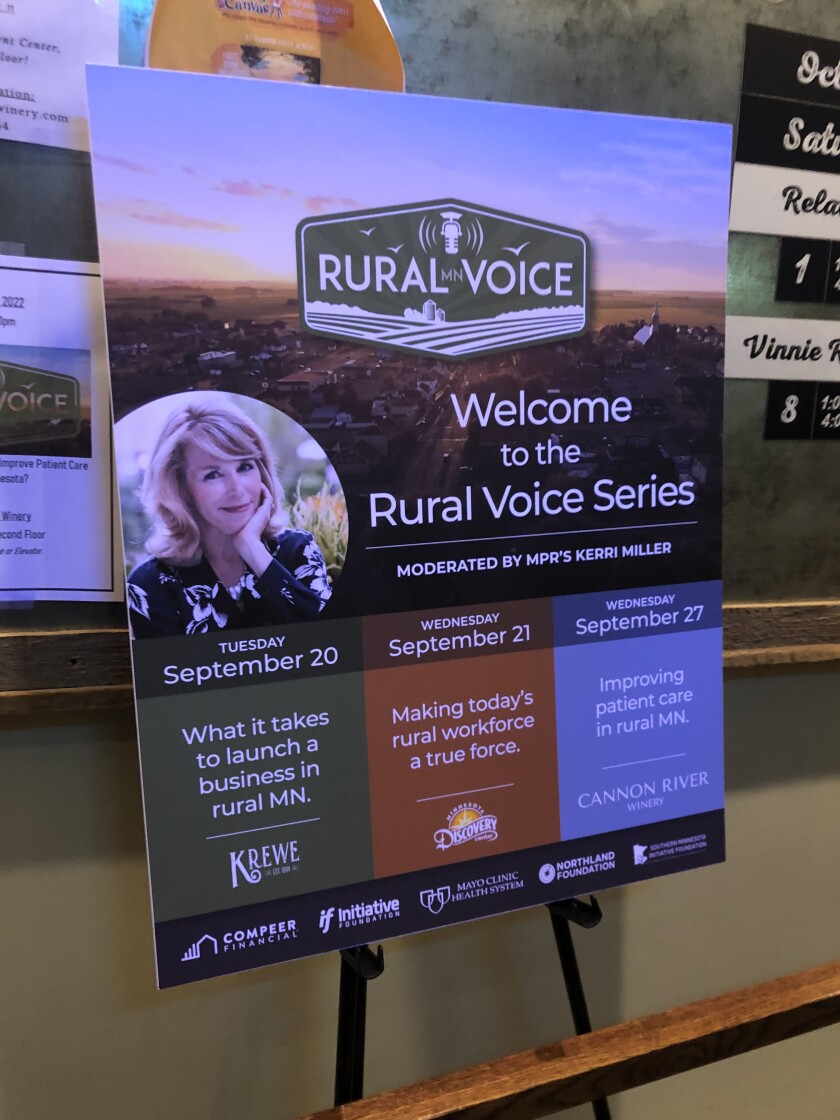CANNON FALLS, Minn. — When it comes to practicing medicine in small communities, is health care set up all wrong? That was just one of the big questions to come up this week during a Cannon Falls town hall on health care in rural Minnesota.
The Tuesday, Sept. 27, gathering, which was moderated by Kerri Miller of Minnesota Public Radio and organized by a trio of regional foundations with sponsorship from Compeer Financial and Mayo Clinic Health System, had a simple goal:
ADVERTISEMENT
Gather a wide array of policy experts, farm leaders, community leaders and family doctors from competing health systems, and start a conversation on the state of community hospitals.
Though a mic was open to all, the weekday evening turnout favored the views of stakeholders more than patients. As a result, the hour returned again and again to structural problems holding back health services in small towns.
"I've been really struck by how fragile our health care system really is," said a Sauk Center family practice physician for CentraCare. "There isn't enough staffing at those bigger facilities to be able to take in our sick patients. It's very tiring to have to call hospitals all over the state to get our patients the level of specialty care they need."
The staff shortages afflicting metro providers are only compounded in rural facilities, participants said. Part of that is due to small-town providers who choose a job in the city over one in the community.
"It's great to live in a small town," Wigert said. "I grew up in a small town, and I chose to work in a small town. But right now, people can commute to a bigger facility to get paid more, all while keeping a different lifestyle in the small communities."
Others said the attrition underway within rural health systems could only be reversed by training physicians in small towns.
"Do you think we are going to get rural physicians by educating them in Minneapolis?" asked the Willmar-based senior vice president of rural health for CentraCare.
ADVERTISEMENT
"No offense, but do you think we can educate them in Minneapolis, then expect them to move into our rural areas? We need to educate them in rural areas, they'll discover why we love it, and we hope they'll stay."
"Our research is finding financial incentives are effective in attracting workers in small communities, but they are not the only thing, or even the main thing," concurred deputy director, University of Minnesota Rural Health Research Center. "Having grown up in a rural area is by far the biggest predictor of rural practice."
Henning-Smith said rural providers could also be enticed by being told they can practice "the way they want to practice," which she described as "seeing a lot of different kinds of patients, and having continuity with those patients and their family members."
For Wigert, this very closeness was what makes her job rewarding.
"We know our patients really well in a rural practice," she said. "When I see them in the grocery store or when their kids are in school with my kids, I can say to them, let's try this first, and come back to me if that doesn't cut it and we'll do an MRI. It's about knowing you will have that follow-up relationship."
When an online participant asked if allied health professionals could take on bigger roles, a family doctor for Allina Health in Faribault, said he supported the idea.
"I've sat in a room with nurse practitioners and physician assistants who do things that a lot of medical students would be very uncomfortable doing, but they have the experience and support to do it ... Patients want to be able to come in and talk to somebody who cares about what happens to them, that's the bottom line."
ADVERTISEMENT

For professor in the Division of Health Policy and Management in the �������� of Public Health at the University of Minnesota, the situation won't change for rural medicine until payers rethink how to pay for health care in remote places.
"We get paid based on the number of people who walk through the door," she said. "But in rural places, fewer people come through the door ... So there's a need for a lot more thoughtful ways of supporting the higher fixed costs that rural facilities face."
She said special critical care hospital payment status was not enough, and that value-based payment approaches in which doctors are paid for keeping patients healthy were equally as fraught in small practices.
"When you have small numbers or you care for a population that's sicker, may have higher risk factors, or may not get care as often, you're more likely to show quote-unquote 'low-quality care' on metrics that are predominantly created in urban communities and academic health centers."
"Many of our credentialing entities are using quality standards that are not rural relevant," Kozhimannil said. "You don't necessarily have the volume to have something available that might be considered some sort of basic level of care. That's not how we roll in rural areas all the time. The money doesn't come in for that."









